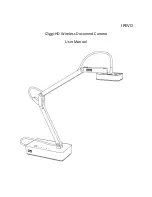
82
•
Additional Reference Information
Falcon™ 4
-CLHS Series
Sensor Handling Instructions
This section reviews procedures for handling, cleaning or storing the camera. The sensor must be
kept clean and away from static discharge to maintain design performance.
Electrostatic Discharge and the Sensor
Camera sensors containing integrated electronics are susceptible to damage from electrostatic
discharge (ESD).
Electrostatic charge introduced to the sensor window can induce charge buildup on the underside of
the window. The dry nitrogen gas in the sensor package cavity cannot readily dissipate the ESD.
Problems such as higher image lag or non-uniform response may occur.
Note:
The charge normally dissipates within 24 hours and the sensor returns to
normal operation.
Important
: Charge buildup will affect the camera’s
Flat-Field Correction calibration.
To avoid an erroneous calibration, ensure that you perform Flat-Field Correction
only after a charge buildup has dissipated over 24 hours.
Protecting Against Dust, Oil and Scratches
The sensor window is part of the optical path and must be handled with extreme care.
Dust can obscure pixels producing dark patches on the sensor image. Dust is most visible when the
illumination is collimated. The dark patches shift position as the angle of illumination changes. Dust
is normally not visible when the sensor is positioned at the exit port of an integrating sphere where
illumination is diffused.
Blowing compressed air on the window will remove dust particles unless they are held by an
electrostatic charge. In this case, either an ionized air blower or a wet cleaning is necessary.
Touching the surface of the window will leave oily residues. Using rubber finger cots and rubber
gloves can prevent oil contamination. Avoid friction between the rubber and window or electrostatic
charge build up may damage the sensor.
When handling or storing the camera without a lens always install the protective cap.
Note:
When exposed to uniform illumination a scratched window will normally have
brighter pixels adjacent to darker pixels. The location of these pixels will change
with the angle of illumination.
Summary of Contents for Falcon 4-CLHS Series
Page 14: ...12 Falcon4 CLHS Specifications Falcon 4 CLHS Series Effective Quantum Efficiency ...
Page 87: ...Falcon 4 CLHS Series Additional Reference Information 85 Cable Assembly G5 AIOC BLUNT2M ...
Page 88: ...86 Additional Reference Information Falcon 4 CLHS Series ...
Page 89: ...Falcon 4 CLHS Series Additional Reference Information 87 Generic Power Supply with no I O ...










































